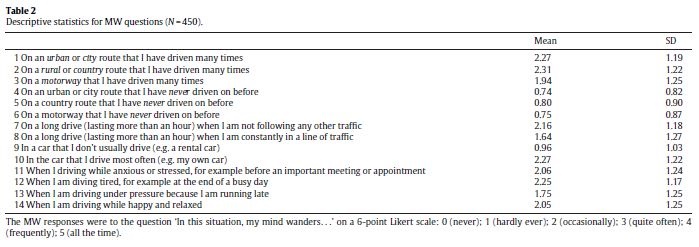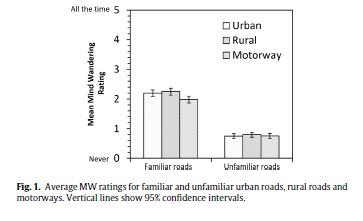New Zealand - Work, home, kids to school... a daily routine quickly becomes part of our lives and before we know it, you're accomplishing tasks akin to switching on your brain's 'autopilot.
Such tasks include driving on a fixed route everyday. Drivers become accustomed to every bend, every landmark and road sign. At times, complacency creeps in and motorists tends to 'multi-task' while driving.
Eating, texting and, particularly concerning, daydreaming while on the road are forms of distracted driving which can be deadly on our roads.
New Zealand's University of Waikato transport researcher, Bridget Burdett, tapped in to drivers' thoughts behind the wheel.
Burdett said that drivers aren't thinking about driving close to 90% of the time when they're on a familiar trip such as daily commute.
The study is titled 'Not all minds wander equally: The influence of traits, states and road environment factors on self-reported mind wandering during everyday driving'.
The study concluded that crashes that result in injury confirms the so-called 'close-to-home effect'.
The effect explains that half of injuries caused in crashes occur with 7km of a motorists home and that's the area drivers are, the study says, are most likely to be distracted by daydreaming, cellphones or food. Alcohol is also a 'close-to-home' factor. The likelihood of drunk drivers crashing doubles when they're within 5km of home. The study focused on the issue of day-dreaming while driving with results that may be of a concern to many road users.
Don't let your mind wonder...
The study showed that respondents daydream on routes they frequently use. This includes ubran, city and rural roads.
Drivers also tend to drift off mentally on drives that last longer than an hour. Drivers occasionally day dreamed when driving in a vehicle they use often. Respondents said they were more likely to daydream behind the wheel towards the end of the day.
See table below for results:
Statistics comparing mind wandering on familiar and unfamiliar roads:
The problem of mind wandering
The study said: "Inattention is a road safety problem, but few studies have focused specifically on mind wandering during everyday driving.
"This explores differences in self-reported mind wandering according to driver demographic characteristics (including age and gender), cognitive traits (such as tendency toward cognitive failure or mindful attention), states (such as feeling tired or stressed) and road environment factors (such as route familiarity).
"502 persons (113 male, average age 44.4 years, SD=14 years) completed a series of questionnaires (Mindful Attention and Awareness Scale (MAAS), Cognitive Failures Questionnaire (CFQ) and Driver Behaviour Questionnaire (DBQ), as well as study-specific questions about mind wandering during different personal states and across a range of road and traffic situations.
"All respondents reported mind wandering during driving at least some of the time. Mind wandering was more likely to be reported on familiar roads than on unfamiliar roads and when drivers are tired.
"Together, the findings suggest that mind wandering is common in everyday driving, however any link with crash risk remains unclear."




 Publications
Publications
 Partners
Partners














